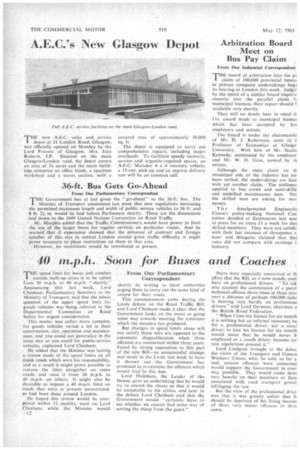40 m.p.h. Soon for Buses and Coaches
Page 38

If you've noticed an error in this article please click here to report it so we can fix it.
THE speed limit for buses and coaches outside built-up areas is to be raised from 30 m.p.h. to 40 m.p.h. "shortly." Announcing this last week, Lord Chesham, Parliamentary Secretary to the Ministry of Transport, said that the whole question of the upper speed limit for goods vehicles was being referred to the Departmental Committee on Road Safety for urgent consideration.
This matter was rather more complex. for goods vehicles varied a lot in their construction, size, operation and maintenance, and you could not generalize in the same way as you could for public-service vehicles, explained Lord Chesham.
He added that the Minister was having a review made of the speed limits on all trunk roads which were his responsibility, and as a result it might prove possible to remove the limit altogether on some roads, and raise it from 30 m.p.h. to 40 m.p.h. on others. It might also be desirable to impose a 40 m.p.h. limit on roads that were at present unrestricted. as had been done around London.
He hoped this review would be completed within 12 months, went on Lord Chesham, while the Minister would c2
From Our Parliamentary Correspondent
shortly be writing to local authorities urging them to carry out the same kind of review for their roads.
This announcement came during the Lords debate on the Road Traffic Bill. and Lord Chesham made it clear that the Government looks on the move as going some way towards meeting the criticisms which the measure has produced.
But changes in speed limits alone will not satisfy those who are opposed to the automatic disqualification when three offences are committed within three years. : Faced by strong opposition to this part of the new Bill—an unsuccessful attempt was made in the Lords last week to have it thrown out –the Government has promised to re-examine the offences which would lead 'to this ban.
Lord Hailsharn. the Leader of the House. gave an undertaking that he would try to amend the clause so that it would be acceptable to the critics, and later in the debate Lord Chesham said that the Government would "certainly have to see whether we cannot find some way of sorting the sheep from the goats."
Peers were especially concerned at th effect that the Bill, as it now stands, coul have on professional drivers. "To tak into account the commission of a purel technical offence three times in three year over a distance of perhaps 100,000 mile! is bearing very hardly on professions drivers," said Lord Derwent, chairman o the British Road Federation.
" When lose my licence for six month it is nothing but an infernal nuisance; by for a professional driver, say a cone] driver, to lose his licence for six month would mean that he would never b employed as a coach driver, because cer tam n regulations prevent it."
Lord Lindgren brought to the debat the views of the Transport and Genera Workers' Onion. who, he said, so far a real, serious offences were concerned would support the Government in ever: way possible. They would come dowi very heavily on their members or thos1 associated with road transport grossl: infringing the law. But the view of the professional drive was that it was grossly unfair that hi should he deprived of his living becausi of three very minor offences in threc years.
























































































































